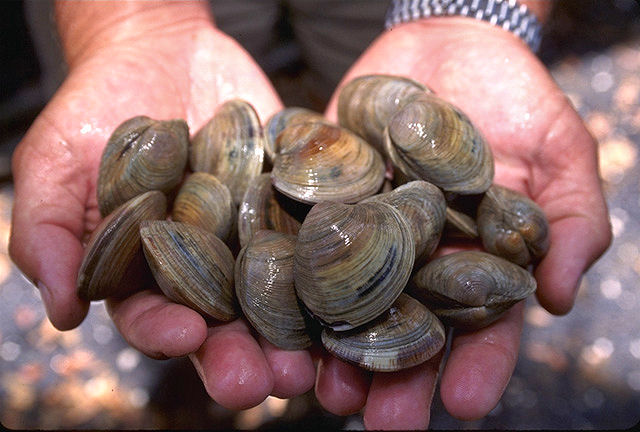Of all these names, the most distinctive is quahog (pronounced /ˈkwɔːhɒɡ/ "KWAW-hog", /ˈkoʊhɒɡ/ "KOH-hog", or /kwəˈhɒɡ/ "kwə-HOG"). This name comes from the Narragansett word "poquauhock" (the word is similar in Wampanoag and some other Algonquian languages), and is first attested in North American English in 1794. As New England Indians made valuable beads called wampum from the shells (especially the purple color), the species name mercenaria is related to the Latin word for "money."
By Lois Scozzari
In the 1630s, a large migration of English Puritans to Massachusetts Bay presented another complication. The colony interposed itself into the trade network creating increased competition, rivalry, and agitation. For the period between 1630 and 1660, wampum was a prized commodity in New England spurred on by the fur trade that compelled the struggle. What followed in the next several decades leading up to King Philip's War (1675-1676) was a complicated series of initiatives from the Bay Colony, whose ultimate goal was to control the region and resources. Ruth Thomas of the Mashantucket Pequot put it simply, "They wanted to cut out the middleman," and so they did, isolating, then devastating first the powerful Pequot, then the dynamic Narragansett, and then appropriating both the land and control of the wampum trade. The Bay Colony, having found small beads more portable than corn for trade and saving coin for European markets, declared wampum legal tender in 1637 valued at six beads a penny.
By 1660, wampum had decreased in value for the English and was discontinued as legal tender in Massachusetts with Connecticut and Rhode Island following a year later. However it remained in the native economy and in rural colonial areas until the Revolutionary War. As late as 1693, one could ride the Brooklyn, Connecticut ferry for 8 stevers of wampum or a silver 9-pence.
Quahogs => wampum => fur trade => economic dependence => land acquisition and theft
But the Family Guy episode on the founding of the fictional town of Quahog doesn't even mention Indians. I guess the town's name just popped into Griffin Peterson's mind by magic.
So a good example of how Indians influenced American history and culture is ignored--omitted from the record. Instead we get a good example of how Indians are rendered invisible in the mainstream media.
For more on the subject, see TV Shows Featuring Indians.


No comments:
Post a Comment